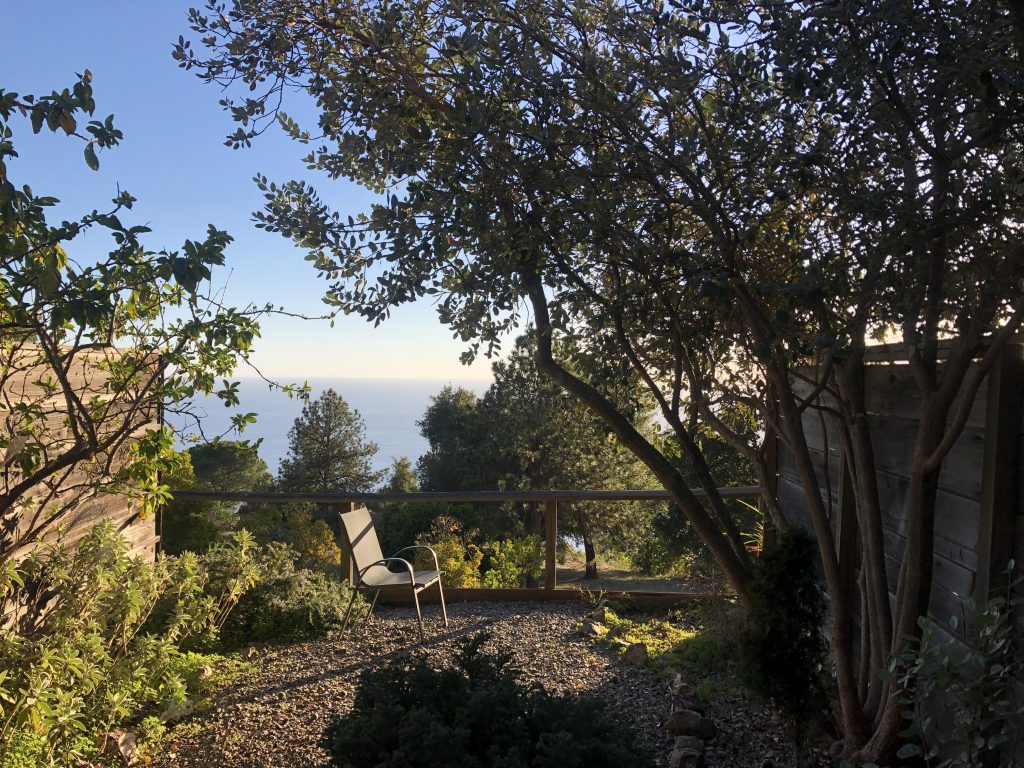New Camaldoli Hermitage, a monastery of Camaldolese Benedictine monks, is located on 899 acres high above the Big Sur coast. It’s gorgeous. It’s serene. And best of all, it’s quiet.
Used to be you’d have to book months in advance, but I recently reserved a single-occupancy room for two nights ($145 including meals) a mere few weeks out. Other options include five private hermitages, three of which can accommodate couples; private cells (male retreatants only) within the monastic enclosure; and a guest house with two twin beds. No kids under 16 allowed — like I said, quiet.
Advent had just begun, and everything about the place was conducive to contemplating the birth of Christ and the coming of a new year.
The whole front wall of my room was taken up by windows that overlooked the Pacific and a private outdoor sitting area planted charmingly with trees, bushes, and flowers. The spic-and-span communal kitchen, two doors down, was fully stocked with coffee, tea, hard-boiled eggs, yogurt, toast, jam, fruit, milk, juice, and peanut butter.
Dinner was a hearty soup and salad. Lunch, the main meal of the day, was soup, spanakopita, baked chicken, rice pilaf, a green salad, and a red cabbage and pepper salad, all homemade.
Each room has its own toilet and sink. Adjacent to the kitchen area are two communal showers, also very clean and with steaming hot water.
The view, the fresh clean air, and the stars at night were simply splendid.
In winter my circadian rhythm tends to a rise-at-4 a.m., retire-at-9 p.m. cycle, which afforded many hours of complete silence and prayer.
During the day, you can walk to the bottom of the very steep and windy drive, about three miles round trip. Sycamores, coastal chaparral, and toyon blanketed the hills. Scrub jays chattered from the trees, flashing blue as they swooped from branch to branch. The air smelt of wild fennel. Stands of tall, pale gold pampas grass rippled in the sun.
From above, the Pacific was smooth as glass, silvery in the distance and deep aquamarine in the shallows. A line from the Divine Office’s Invitatory Psalm sang in my heart: “He made the sea; it belongs to him.”
The Fence Loop Trail, a mile or so long, meanders into the woods and hills above the Hermitage in the opposite direction. A bookstore, draped with purple wisteria in spring, sells icons, monastery-made preserves and creamed honey, and titles by such authors as Henri Nouwen, Thomas Merton, Richard Rohr, and Bede Griffiths.
The chapel is open 24/7, and visitors are invited to pray the Divine Office along with the monks: lauds at 5:30 a.m., vigils at 7 a.m., a brief noon prayer, and vespers combined with Mass at 5 p.m.
The aesthetic leans Zen, but on the feast of St. Andrew the priest gave a wonderful homily. We’re called to leave behind not just the “nets” of our plans and our possessions, he invited us to ponder, but our resentments, our petty jealousies, and our fears as well.
We’re called to respond to Christ’s call even if we feel inadequate, awkward, unsure, and not up to the task.
“Let’s be silent for a moment,” he concluded. “Is Jesus calling you?”
Outside, it was dark already. Rain was predicted for the next day with an 80% chance at noon, the time I’d planned on leaving. The only way in or out of New Camaldoli is Route 1, the coast road, which is dramatic, majestic, rugged — and even under the best of circumstances also a teeny bit scary.
There is no cell reception and no Wi-Fi up on the bluff, so I’d begged what weather info I could from the people in the bookstore.
Back in my room, I gazed out at the stars. The older I get, the more keenly aware I am that our time on earth is finite. I’d stayed once before at New Camaldoli, many years before: would I pass this way again?
Is Jesus calling you?
Would I fulfill whatever little mission on earth I’d been given? Would I die alone?
I opened the book I was reading — “A Philosophy of Walking,” by Frédéric Gros — and turned to the chapter called “Pilgrimage.”
“The primary meaning of peregrinus is foreigner or exile. The pilgrim, originally, is not one who is heading somewhere (Rome, Jerusalem, etc.), but essentially one who is not at home where he is walking. In other words, not a stroller taking a few turns around the neighborhood after dinner, or a landowner making a Sunday round of his plantations. For the pilgrim is never at home where he walks: he’s a stranger, a foreigner.”
Dawn the next morning rose mistily. I took one last walk down the drive, drinking in the views, the Torrey pines, the smell of rosemary, the brisk, achingly clean air.
Again from “A Philosophy of Walking”: “The Christian passes through this life like a walker in any country: without stopping. These lines, for example, are found in the chant of the Compostela pilgrim: ‘Companion, we must make our way/Without lingering.’ ”

